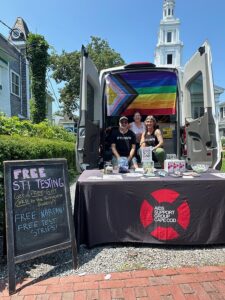PROVINCETOWN — A Supreme Court ruling on June 27 preserved a requirement in the Affordable Care Act that insurance companies cover preventive care at no cost to patients — including pre-exposure prophylaxis, or PrEP, medications that prevent the transmission of HIV.

The case was originally filed by a group of insurance companies and Christian organizations that objected on religious grounds to the requirement to pay for PrEP, arguing that it “facilitates homosexual behavior.” In a 6-3 opinion written by Justice Brett Kavanaugh, the Court sided with the government and upheld the authority of an appointed task force to identify preventive treatments that must be covered.
Although the Trump administration chose to defend that law before the Supreme Court, it has also proposed cutting $1.5 billion per year from domestic HIV programs in its fiscal 2026 budget, according to a KFF analysis.
Officials and experts in Massachusetts warn that efforts to cut and “restructure” federal funds could imperil local prevention programs, including for HIV and mpox, or monkeypox, on the Outer Cape.
The Centers for Disease Control has historically been the source for nearly all domestic HIV prevention funding, according to the KFF analysis. President Trump’s new budget proposal would eliminate $794 million for HIV prevention from the CDC’s budget and move another $220 million earmarked for the “Ending the HIV Epidemic” program into a new proposed agency, the “Administration for a Healthy America.”
Within that billion dollars of funding is a $9-million annual HIV prevention and surveillance grant that the state Dept. of Public Health (DPH) uses for outreach to high-risk individuals, screenings for PrEP prescriptions, referrals for mental health care and substance use treatment, and more than 43,000 integrated HIV, Hepatitis C, and syphilis tests statewide.
A line item in the state budget also helps fund HIV prevention services, DPH Commissioner Robert Goldstein told the Independent, but about half of the agency’s budget comes from the federal government. Losing federal support for testing and outreach will have real effects, he said.
Outer Cape Health Services CEO Damian Archer said he had already been notified of a 10-percent cut in the state’s support for the health center’s “testNtreat” sexual health program, which is mostly funded by DPH.
The DPH cuts are being made “in anticipation of federal cuts happening to the whole system,” Archer said.
“What’s so frustrating” about the cuts, Goldstein said, is that the $220 million “Ending the HIV Epidemic” program was launched during Donald Trump’s first term as president.
“At the time, President Trump recognized that in order to address the HIV epidemic and meet the goals that we have for this country, we needed a specific funding stream and a plan,” Goldstein said. “He now is walking away from that commitment he made previously to ending the HIV epidemic.”
Dan Gates, president of the AIDS Support Group of Cape Cod, said that the $220 million “Ending the HIV Epidemic” program is clearly “at high risk.”
HIV-related cuts will also affect harm-reduction work involving opioids and other substance use, Gates said, since the connection between opioids and needles means that many harm-reduction programs are funded as HIV prevention.
No State Rescue
Two fiscal years ago, the state spent over $35 million on HIV prevention and services, mostly through the DPH — but as CDC grants disappear, the state is also spending less of its own money.
The line item for HIV prevention services in the state budget dropped to $32 million last year and is projected at $31.8 million in the upcoming fiscal year.
Gates said the AIDS Support Group is expecting a shortfall of over $100,000 in its budget next year that is “directly connected” to those state budget cuts and expected federal cuts.
The AIDS Support Group had planned to hire two harm-reduction specialists in the coming year: “frontline team members who work at sites like our P’town drop-in center and perform screenings, outreach, and do Narcan and overdose response,” Gates said.
The shortfall means those two positions won’t be filled, he said.
The organization also shelved a plan last year to expand its needle-exchange program from Provincetown — which first hosted such an effort in 1995 — to the other Outer Cape towns and Orleans. The boards of health in those towns had approved the plans, Gates said, but “over $200,000 that we’d anticipated for that was paused” due to the drop in state funding in fiscal 2025.
Sean Cahill, director of health policy research at the Fenway Institute, an HIV/AIDS research center in Boston, has advocated that the legislature restore state funding to the $35 million mark. “Given what’s happening at the federal level,” the money is more important than ever, he told the Independent.
Cape and Islands state Sen. Julian Cyr proposed increasing state HIV prevention funds back to $35 million in an amendment to the state budget this year, but that amendment did not pass.
“The reality is the state will not be able to backfill all of these cuts,” Cyr told the Independent.
No Mpox Shots
Cahill said that the CDC’s surveillance and prevention support — part of the $1.5 billion in HIV-related funding that is likely to be canceled — had been invaluable during unexpected outbreaks, including the global monkeypox, or mpox, outbreak of 2022.
“It’s because of the surveillance system that CDC runs and funds with state and local health departments that we were able to know that there were these cases of mpox in May 2022,” Cahill said.
The mpox vaccination vans and other outreach efforts in Provincetown that year were largely funded through a CDC grant, Goldstein said — an award of nearly $800,000 that “gave us the resources we needed” to make the Jynneos smallpox vaccine available at Outer Cape Health Services and the AIDS Support Group.
In subsequent years, the ASGCC has run mpox vaccination pop-ups every summer, including during Bear Week events at which hundreds of people have been given the Jynneos vaccine to protect them from infection, Gates said.
Those won’t be happening this Bear Week, Gates said. The group that provides the nurses for those events, CDR Maguire, told the AIDS Support Group in June that it can’t afford the pop-up this year because of state and federal cuts.
Vaccine events “had been scheduled for every weekend of this summer,” Gates said, but they “stopped due to funding on July 1.”
Cuts like this are “really painful,” Gates said. Sexual health services are “an important thing for the community.”



